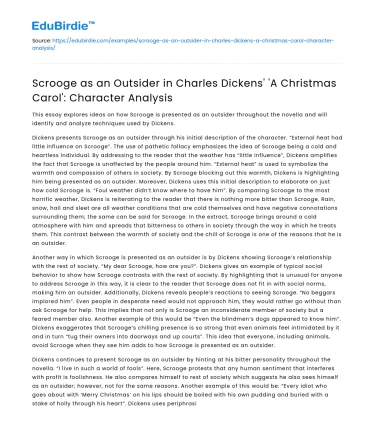This essay explores ideas on how Scrooge is presented as an outsider throughout the novella and will identify and analyze techniques used by Dickens.
Dickens presents Scrooge as an outsider through his initial description of the character. “External heat had little influence on Scrooge”. The use of pathetic fallacy emphasizes the idea of Scrooge being a cold and heartless individual. By addressing to the reader that the weather has “little influence”, Dickens amplifies the fact that Scrooge is unaffected by the people around him. “External heat” is used to symbolize the warmth and compassion of others in society. By Scrooge blocking out this warmth, Dickens is highlighting him being presented as an outsider. Moreover, Dickens uses this initial description to elaborate on just how cold Scrooge is. “Foul weather didn’t know where to have him”. By comparing Scrooge to the most horrific weather, Dickens is reiterating to the reader that there is nothing more bitter than Scrooge. Rain, snow, hail and sleet are all weather conditions that are cold themselves and have negative connotations surrounding them; the same can be said for Scrooge. In the extract, Scrooge brings around a cold atmosphere with him and spreads that bitterness to others in society through the way in which he treats them. This contrast between the warmth of society and the chill of Scrooge is one of the reasons that he is an outsider.
Save your time!
We can take care of your essay
- Proper editing and formatting
- Free revision, title page, and bibliography
- Flexible prices and money-back guarantee
Another way in which Scrooge is presented as an outsider is by Dickens showing Scrooge’s relationship with the rest of society. “My dear Scrooge, how are you?”. Dickens gives an example of typical social behavior to show how Scrooge contrasts with the rest of society. By highlighting that is unusual for anyone to address Scrooge in this way, it is clear to the reader that Scrooge does not fit in with social norms, making him an outsider. Additionally, Dickens reveals people’s reactions to seeing Scrooge. “No beggars implored him”. Even people in desperate need would not approach him, they would rather go without than ask Scrooge for help. This implies that not only is Scrooge an inconsiderate member of society but a feared member also. Another example of this would be “Even the blindmen’s dogs appeared to know him”. Dickens exaggerates that Scrooge’s chilling presence is so strong that even animals feel intimidated by it and in turn “tug their owners into doorways and up courts”. This idea that everyone, including animals, avoid Scrooge when they see him adds to how Scrooge is presented as an outsider.
Dickens continues to present Scrooge as an outsider by hinting at his bitter personality throughout the novella. “I live in such a world of fools”. Here, Scrooge protests that any human sentiment that interferes with profit is foolishness. He also compares himself to rest of society which suggests he also sees himself as an outsider; however, not for the same reasons. Another example of this would be: “Every idiot who goes about with ‘Merry Christmas’ on his lips should be boiled with his own pudding and buried with a stake of holly through his heart”. Dickens uses periphrasis to convey how needlessly aggressive Scrooge can be. By openly declaring his love for Christmas, Fred appears to torment Scrooge, who reacts negatively and in an over-the-top fashion. In turn, this provokes the reader into perceiving Scrooge as an outsider.
Similarly, Scrooge is shown as an outsider across his interactions with others. “What reason have you to be merry? You’re poor enough”. In this part of the text Scrooge is ill mannered and rude; this amplifies the fact that Scrooge does not understand the true meaning of Christmas and reiterates that Scrooge values money above all else. This also shows how Scrooge is materialistic and has a strong capitalistic point of view, setting him aside from the rest of society. Additionally, a key interaction that presents him as an outsider would be “If they’d rather die, they had better do it and decrease the surplus population”. This highlights Scrooge’s ignorance and disconnection from the poor. Scrooge views people of lower class as numbers rather than part of the human species, he believes that the world would be better off if the poor were disposed of. His own superiority complex enhances the idea of scrooge being presented as an outsider.
Finally, Dickens presents Scrooge as an outsider by showing how he was isolated in previous years. “There he was, alone again when all the other boys had gone home”. Dickens illustrates the notion that scrooge is an outsider by removing all others from the situation. Whilst all the other students are free to go home to their families, scrooge is left physically and emotionally distant from his home thus making him an outsider. “A solitary child neglected by his friends”. Relating to this, Dickens repeats the adjective ‘solitary’ later in the novella to clarify that Scrooge has been separated from society ever since he was a child; moreover, the adjective ‘neglected’ emphasizes the concept of Scrooge’s isolation and loneliness.
In conclusion, Dickens presents Scrooge as an outsider through most of the novella. This is influenced by Scrooge’s self-centered mindset, capitalistic views, relationship with society and primarily Scrooges neglect in his earlier years.






 Stuck on your essay?
Stuck on your essay?

